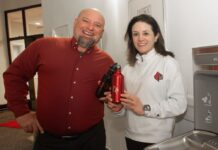What about that chocolate bar you ate yesterday? Did child slave labor factor into the production of the cocoa that went into it?
Often, only a few cents of the amount we pay for a cup of coffee makes it to the farmers and they struggle to support their families. And human trafficking of children to work on Ivory Coast cocoa plantations has been a chronic problem in the last decade.
As UofL works to become a more sustainable university, we need to keep in mind these and other global human rights issues in developing countries. That is why the group Fair Trade UofL advocates purchasing fair trade products made by artisans in the developing world and strives to teach students, faculty and staff that their purchases can affect someone else’s health, education and dignity.
Anyone at UofL – students, faculty and staff – who wants to know more about fair trade can join Fair Trade UofL. One of our main goals is to educate the student body about fair trade and how it can help alleviate global poverty.
Fair trade is not just about a fair price. It is a social justice movement that aims for a trading partnership with artisans in developing countries. This partnership is a long-term relationship based on dignity, better working conditions, sustainability and securing workers’ rights. The movement also seeks to bring work to the most rural communities where opportunities are scarce, and includes people often marginalized in their communities, such as women and people with disabilities.
Fair Trade UofL also is working to become one of the few universities in the country to be designated a Fair Trade University by TransFair USA, a fair trade labeling organization. To become a Fair Trade University, we have to carry a variety of fair trade items and be dedicated to educating the campus community about fair trade practices.
UofL already sells only fair trade coffee at the Tulip Tree Café (which carries locally produced Heine Brothers) and at other Sodexo-provided campus dining facilities (Ville Grill, Jazzman’s, Simply to Go locations, The Nest convenience store and Flavours Catering).
But we can further commit to the movement by selling fair trade chocolate, fruits, paper, book bags and handmade gifts. It is even possible to have a UofL clothing line printed on fair trade clothing. We especially need student support to make all of this happen, though. With as many socially conscious students as UofL has, we should be able to create demand for more fair trade products.
If you are interested in becoming part of the movement to make UofL a Fair Trade University, visit our Facebook page, Fair Trade UofL, for updates, or email questions to fairtrade.uofl@gmail.com. Consider joining the movement—we hope that you’ll work with us for greater fairness. Issues of fairness are central in a university education and should be central in how we live.


























